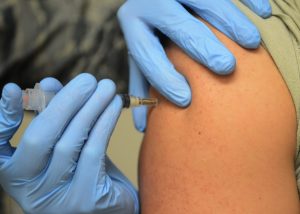
Nurses such as you and me – yes, that means all nurses (and our welcomed health care counterparts) – likely come across a patient or parent who declines vaccinations for themselves or their children. And it is not uncommon for nurses to be first in line to receive the unfavorable statements refusing these life-sustaining vaccines.
While every nurse may provide vaccine education at some point in a patient’s life, those in neonatal and maternal-newborn nursing have a greater responsibility with the hepatitis B vaccine. It is for good reason the hep B vaccine is the first immunization given to newborns within 24 hours of birth, followed by a second dose at 1 months, and the third at 6 months. However, communicating those reasons to parents of our newborn patients takes a compassionate, strong and skillful approach. Especially when we are faced with resistance and the unyielding declinations for the hepatitis B vaccine.
There are various clinical settings and times when nurses can educate new parents and those with children about how the hepatitis B vaccine works and why it is necessary. We have numerous opportunities to identify misconceptions, fears and inaccurate information a parent might have regarding the vaccine. When addressing the highly recommended CDC’s vaccine schedule with parents, the rule of thumb is letting them know to expect their child will get the hep B vaccine series starting at birth. It is typically at this time when pushback from the parents begins to emerge. First and foremost, determining the “why” in what is making the parent hesitant about or declining the hep B vaccine is vital when trying to help them understand the reason vaccination is strongly advised.
Resistance to hep B vaccination typically relates to not understanding the risks of contracting the virus, a perceived low risk of exposure or safety of the vaccine. Educating parents about complications that acquiring hepatitis B can have on the body can emphasize the vaccine’s purpose. Nurses need to use language that is concise and easy to understand. Nurses can let parents know hepatitis B is a virus that causes inflammation of the liver that damages and compromises its function, which can and often does lead to liver disease and ultimately cancer. Unlike a common bacterial infection that can quickly be treated with antibiotics, acquiring a hepatitis B infection can mean living with a chronic, life-long and potentially life-threatening illness. And the vaccine was established to provide a solution to that problem.
Parents who perceive a low risk of their child becoming exposed typically minimize the need for the vaccine. A major misconception is that individuals who have hepatitis B have engaged in risky sexual behaviors or are drug users. To counter this impression, we want to make it very clear that hepatitis B can affect anyone. In fact, 40% of people in the U.S. who have a new hepatitis B infection don’t have any known risk factors. It could be helpful to educate parents using real-life scenarios about how the risks are present outside of stigmatized behaviors. For example, educate them that hepatitis B can be spread if their child shares a razor, toothbrush or nail clipper with someone who has the virus.
If a parent is on the fence about the hep B vaccine, they might come with assumptions rather than questions. They may state, “My baby is too young, he doesn’t have an immune system yet.” You can let them know: “The hep B vaccine is synthetically prepared with small bits of viral protein and does not contain any blood products. This means the vaccine contains no actual virus and cannot infect anyone.” Educating parents about what the vaccine is will help explain how it actually works. You could say: “By introducing a small part of the virus, the body will learn to recognize the virus in case of future exposures and will protect someone for a lifetime.”
Parents will often raise safety concerns about the vaccine and the erroneous allegations that it can cause autism. This misconception is tied to a preservative (thimerosal) once used in vaccines and this misinformation still lingers on social media. The most effective way to communicate with parents who harbor this misguided belief is by emphasizing the information from trusted and reliable national public health agencies. Nurses could inform parents that thimerosal is no longer used in the hepatitis B vaccine (or any other childhood vaccine except flu), and a page on the Children’s Hospital of Philadelphia website (June 1, 2021, https://www.chop.edu/centers-programs/vaccine-education-center/vaccine-ingredients/thimerosal) explains why thimerosal in vaccines isn’t harmful. Also, the single study suggesting that link has been discredited and withdrawn from publication, and the physician-author has been banned from practicing medicine (The New York Times, May 24, 2010, https://www.nytimes.com/2010/05/25/health/policy/25autism.html).
As for the hepatitis B vaccine, as you can read on the Hepatitis B Foundation’s website, “The most highly respected public health agencies and professional medical associations have rigorously studied the safety of the hepatitis B vaccine” (https://www.hepb.org/prevention-and-diagnosis/vaccination/vaccine-safety/).
Hep B is known as a silent killer, and it is a vaccine-preventable disease at that. For nurses, addressing parents’ hesitancy and navigating a “no” for the hep B vaccine is priority when striving for maximum compliance. Nurses equipped with knowing how to voice the facts and recommendations in a way that doesn’t make parents feel argued with support a greater chance at swaying the decision to vaccinate their children. Using examples that parents can connect to helps achieve a level of understanding that can’t be reached with heavy scientific and textbook language. At the end of the day, if you’ve exhausted all resources and information and a parent still declines the hep B vaccine, simply document and hope for reconsideration down the road.
This blog post is written by Lacey Hempeler, RN.
Note: The Hepatitis B Foundation’s consult team can be reached via info@hepb.org.


 The
The